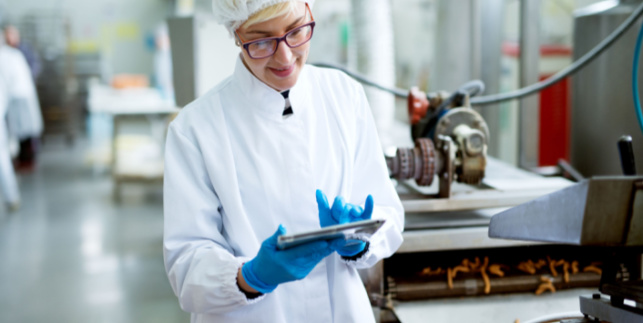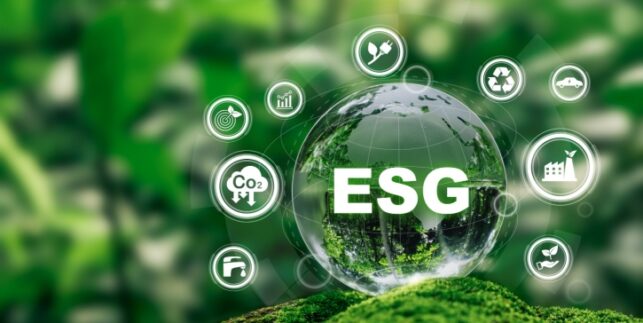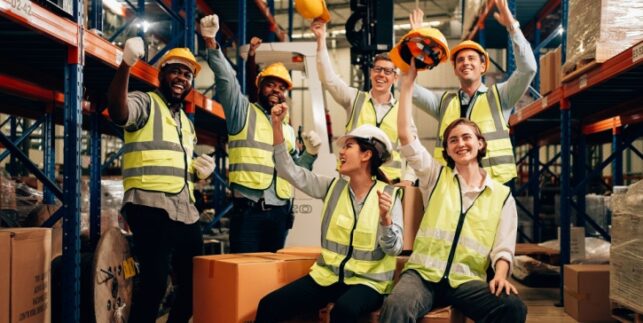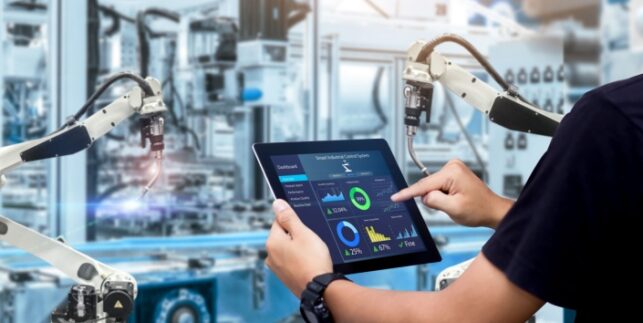Achieving Sustainability in Food and Beverage Manufacturing

Sustainability is among the most important topics in manufacturing today. Manufacturers are facing significant pressure from public opinion and new regulations to reduce waste and develop more sustainable processes.
The food and beverage manufacturing sector is among the most closely scrutinized industries. Waste in the food and beverage sector contributes not only to environmental concerns over energy use and pollution but to food scarcity and resource use concerns as well. These factors have converged to a point where manufacturers must now implement new solutions to meet increasing sustainability demands.
These solutions are arriving in many different forms, from agricultural developments increasing available resources to clean energy sources reducing the impact of industry everywhere. However, in food and beverage manufacturing, digitalization and other Industry 4.0 solutions are allowing manufacturers to improve the sustainability of existing processes with greater visibility, control, and automation.
The Environmental Impact of the Food and Beverage Manufacturing Sector
Today, there are nearly 8 billion people living across the globe. All of them need to eat, and this has led to food production becoming a tremendous global industry. It accounts for 10% of the global economy, over 8 trillion dollars each year.
With so much activity spread around the world, the industry produces significant environmental impact as well. Around 35% of total greenhouse gas emissions come from food production. This includes every step of the process, from farming to food processing. As population and food demand continue to grow, this problem is only expected to increase in severity.
While the majority of these emissions arise from land use, farming, and harvesting, food and beverage manufacturing still directly accounts for a significant portion of all global greenhouse gas emissions. It is the responsibility of manufacturers around the world to reduce waste and improve efficiency to reduce this impact.
Reducing greenhouse gas production is a vital goal for manufacturing, but food and beverage manufacturing, in particular, must also contend with the sustainability of food supplies. UN estimates predict that the world population will be approaching 9.75 billion by the year 2050. This means an increase in food production as well, putting additional demand on manufacturers to reduce waste.
Food waste is an increasingly pressing issue, with significant loss at the farming, processing, and retail stages. Food and beverage manufacturing can see losses of around 5 to 7 percent under normal conditions. As the demand for food grows, manufacturers are under pressure to tighten these waste thresholds.
How Food and Beverage Manufacturers Can Foster Sustainability
While the development of new processes and technology stands to improve the sustainability of food supply chains around the world, there are also solutions that manufacturers can implement today. Industry 4.0 provides a range of new technologies and methods that can let manufacturers reduce material and energy waste, improving sustainability across the board.
Many of these benefits can be achieved through the improved collection and use of production data. Modern solutions make it possible to collect data from all available sources on the factory floor, including individual machines and other systems. This data can then be analyzed and made accessible through a single platform to improve visibility. Continual analysis enables decision-ready insights to be delivered to the right person at the right time, as well as ensures all relevant contextual information is taken into account.
With this improved visibility, operators can react to changes on the factory floor faster and more effectively. When something goes wrong, they have all of the relevant information available directly without the need to go and find it.
Quality control can also be improved. In food and beverage manufacturing, a significant amount of waste arises from rejected units. Having quality data available in real-time lets manufacturers react to problems in their processes before significant waste can accumulate.
Workflow automation can take these benefits even further. A manufacturer can set a KPI threshold for their products and develop custom workflows that spring into action when that threshold is approached. Now, the appropriate operators, technicians, and supervisors can be made aware of any issue immediately.
Maintaining food and beverage production within KPI thresholds allows manufacturers to reach their sustainability goals. When manufacturers put new sustainability policies into place, they can know that they are being followed accurately on the factory floor.
These improvements can have a considerable impact on a manufacturer’s sustainability. When issues are resolved quickly, fewer resources are wasted, producing rejected units. This results in both material savings that reduce the impact on food supplies and energy savings that reduce overall environmental impact. The bottom line is that manufacturers can produce more usable food and beverage products with the same resources.
How Manufacturers Gain by Improving Sustainability
Many organizations around the world feel a responsibility to act on sustainability. However, there are also considerable benefits for manufacturers beyond a sense of obligation and social responsibility. By working to improve sustainability, manufacturers can reduce costs, simplify compliance, and improve their customer relationships.
With real-time monitoring and analysis, manufacturers reduce their material and energy waste. This improves sustainability and decreases costs. Manufacturers lose money when rejected units are made with raw materials and energy that they paid for. Reducing rejected units in production reduces those losses, improving margins for the manufacturer.
Accurate and consolidated production data collection also makes it easier for manufacturers to demonstrate compliance with regulations. Many countries now have strict accounting requirements that manufacturers must meet to demonstrate compliance in order to avoid penalties and higher taxes. Having all production information available for all production runs ensures that vital details aren’t lost due to human error or poor data management.
Manufacturers can also enjoy an improved public perception by implementing sustainability. Negative public perception of food waste can be considerable and could result in unsustainable manufacturers losing significant portions of their consumer base. The opposite is true for manufacturers who achieve progressive sustainability targets, with consumers being more likely to purchase their food and beverage products.

Changing the way people work in factories
Request a DemoAchieving Improved Sustainability With Matics
Matics has a long history of providing effective solutions for manufacturers in the food and beverage industry. We work with a wide range of manufacturers through our Real-time Operational Intelligence (RtOI) solution. This solution gives manufacturers the tools they need to reduce waste, increase efficiency, and achieve continuous improvement.
With Matics, manufacturers gain visibility with real-time production data aggregated from all available sources. This data can be accessed through one simple platform that provides real-time decision ready insight based on contextually analyzed data. Highly customizable, the Matics RtOI dashboard can provide catered access to the platform for operators, technicians, management, and other stakeholders.
Manufacturers can improve sustainability with the robust workflow automation and management tools that the RtOI solution has to offer. Custom KPIs and thresholds can be fine-tuned for individual processes, with analysis providing automated alerts that can trigger custom workflows. The right people in your organization will be able to act rapidly with the necessary information and context.
All of these benefits come together to help your operations improve sustainability. Reduced waste and improved efficiency can result in cost savings, regulatory compliance, and improved reputation. With the continued increase in resource strain, regulatory requirements, and public scrutiny, manufacturers need a solution that can take their sustainability to the next level.
If you’d like to hear more about how Matics helps manufacturers improve sustainability and other metrics across the board, you can contact us to schedule a demo of our solution.




